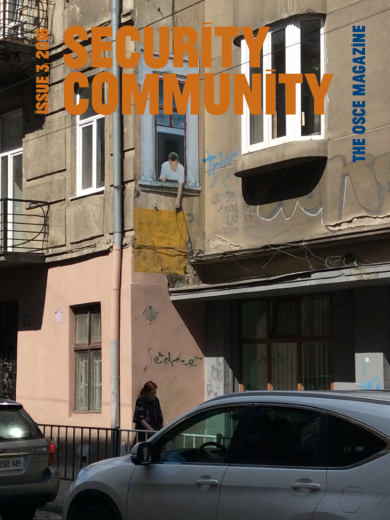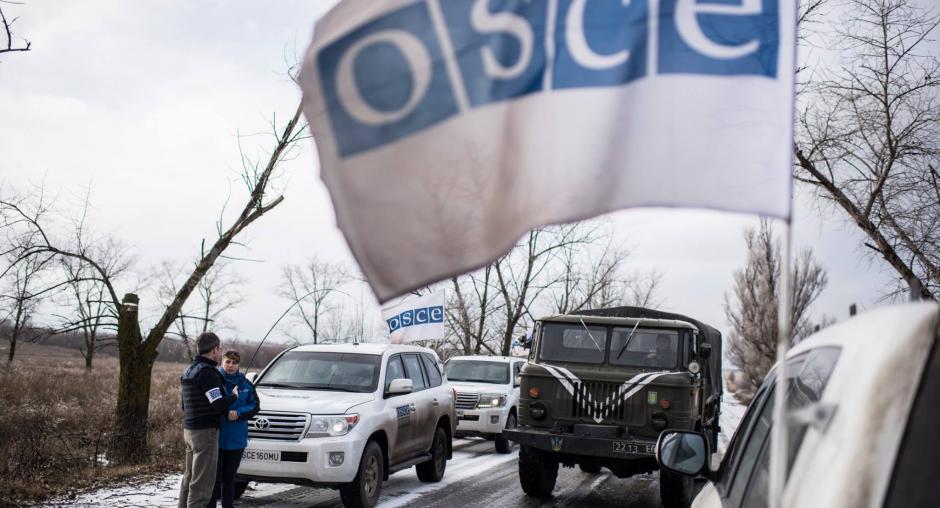The OSCE in Ukraine Update: February 2016 to November 2016
Mediation and Negotiation
OSCE Chairperson-in-Office German Foreign Minister Frank-Walter Steinmeier, OSCE Secretary General Lamberto Zannier, as well as President of the OSCE Parliamentary Assembly Christine Muttonen, continued to use every opportunity to urge an end to the fighting and the fulfilment of obligations under the Minsk Agreements.
The Trilateral Contact Group (TCG) comprises representatives of Ukraine, the Russian Federation and the OSCE (Chairperson-in-Office’s Special Representative Martin Sajdik), and its four Working Groups. On 21 September 2016, the Working Group on Security Issues agreed on a Framework Decision on Disengagement of Forces and Hardware. The document, signed by representatives of the government of Ukraine and of the Russian Federation to the TCG and initialled by representatives from certain areas of the Donetsk and Luhansk regions, provides for, among other things, the disengagement of forces and hardware in three initial disengagement zones on the contact line.
The Political Working Group has been focused on discussions surrounding the modalities of local elections in certain areas of Donetsk and Luhansk regions. Efforts in the Humanitarian Working Group have led to the release of some prisoners and enabled the repair of critical civilian infrastructure. The Economic Working Group has been dealing with questions such as the continued payment of pensions to those entitled on non-government controlled territory.
After a sharp increase throughout the spring and summer months in violation of the ceasefire, a basic requirement of the Minsk Agreements, the TCG on 26 August appealed for its full observation in connection with the start of the school year. After an initial period of relative quiet, the situation has since deteriorated, with on average over 1,000 explosions daily, reaching over 3,000 explosions a day in mid-November, including a high number of incidents involving the use of weapons proscribed by the Minsk Agreements.
Monitoring
The OSCE Special Monitoring Mission to Ukraine (SMM) continued to monitor the security situation in Ukraine and engage with the population to reduce tensions. The Mission’s mandate was extended to 31 March 2017 with an approved budget of €98.8 million, by a consensus decision taken by the 57 OSCE participating States on 18 February.
On 25 May, the SMM established a ninth forward patrol base in the government-controlled town of Shchastia in Luhansk to extend the monitors’ presence near the contact line. The monitors’ movement continues to be restricted, especially in the areas not under government control, and there is a lack of security guarantees on both sides.
As part of its monitoring activities, the SMM took on the role of verifying the Framework Decision of the Trilateral Contact Group of 21 September, as foreseen by the signatories. It monitored the process in the disengagement areas of Stanytsia Luhanska, Zolote/Pervomaisk and Petrivske/Bohdanivka through patrolling and remote observations.
As of 9 November, the SMM included 682 international monitors and a total staff of 1,092. See daily updates on the Mission’s work: www.osce.org/ukraine-smm/daily-updates and two new thematic reports, on restrictions to SMM freedom of movement and conflict-related displacements, published in August: www.osce.org/ukraine-smm/156571
The OSCE Observer Mission at the Russian Checkpoints Gukovo and Donetsk continued to monitor and report on the situation at the two Russian checkpoints, as well as on cross-border movements. Its mandate was extended (on 4 October 2016) to 31 January 2017.
Rights and Freedoms
The Office for Democratic Institutions and Human Rights continues to strengthen dialogue among civil society and government stakeholders in Ukraine. Its projects are focused on human rights monitoring, promoting dialogue and co-operation between Russian and Ukrainian civil society, political party legislation and financing, parliamentary ethics, gender equality mechanisms, law-making, tolerance and non-discrimination and facilitating dialogue among religious or belief communities and Ukrainian authorities. In the period between February and November 2016, around 500 Ukrainian stakeholders benefited from confidence and capacity building, including events on countering hate crime, political party expert workshops, training programmes for gender advisers and seminars on parliamentary ethics.
The situation in Ukraine remained among the highest priorities of the High Commissioner on National Minorities, Astrid Thors, who ended her tenure on 19 August. She visited Kyiv in March to co-host, together with the Verkhovna Rada Committee on Human Rights, National Minorities and Inter-ethnic Relations, a roundtable meeting on strengthening the institutional framework for inter-ethnic relations in Ukraine in the context of decentralization. A follow-up event in October brought together regional state administration focal points to discuss how the HCNM recommendations on the institutional framework could be operationalized at the regional level. Also in October, the office of the HCNM and the National Agency on Civil Service convened an expert discussion on standards and best practices in the area of minorities’ linguistic rights, including in relation to language certification.
The institution continues to draw the attention of the participating States to the situation in the Autonomous Republic of Crimea and the worrying increase in politically motivated pressure on the representatives of the Crimean Tatar community.
The OSCE Representative on Freedom of the Media, Dunja Mijatović, continues to closely monitor the situation regarding media freedom and safety of journalists in Ukraine. During her four-day official visit to Kyiv in October, the Representative met with Foreign Minister Pavlo Klimkin, senior government officials, civil society and the media community and welcomed their commitment to strengthening media freedom in Ukraine. She also called on the authorities to intensify their efforts to end impunity for crimes committed against journalists.
The OSCE Special Representative and Co-ordinator for Combating Trafficking in Human Beings, Madina Jarbussynova, visited the Donetsk region from 1 to 15 August to raise the awareness of central and local authorities, civil society organizations and internally displaced persons (IDPs) about the threat of human trafficking in eastern Ukraine.
Project Co-ordinator in Ukraine
The OSCE Project Co-ordinator in Ukraine continued to assist with Ukraine’s crisis-related challenges, providing expert support to constitutional, judicial and law enforcement reforms and promoting dialogue to rebuild trust between the central government and conflict-affected communities in the east.
Projects include providing support to the government with mine action and elaborating strategies for the social adaptation of IDPs and ex-combatants. Another area of focus is promoting conflict-sensitive journalism and journalists’ safety.
See previous updates on the OSCE’s responses to the crisis in and around Ukraine in Security Community, Issues 2/2014, 3/2014, 1/2015 and 3-4/2015.
Welcome to Security Community
Security Community is the OSCE’s online space for expert analysis and personal perspectives on security issues.
The views expressed in the articles are those of the authors and do not necessarily reflect the official position of the OSCE and its participating States.


